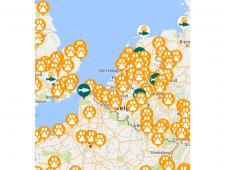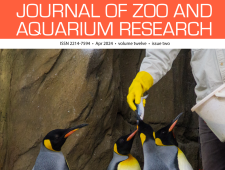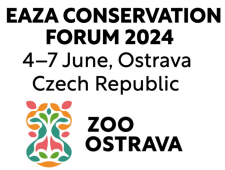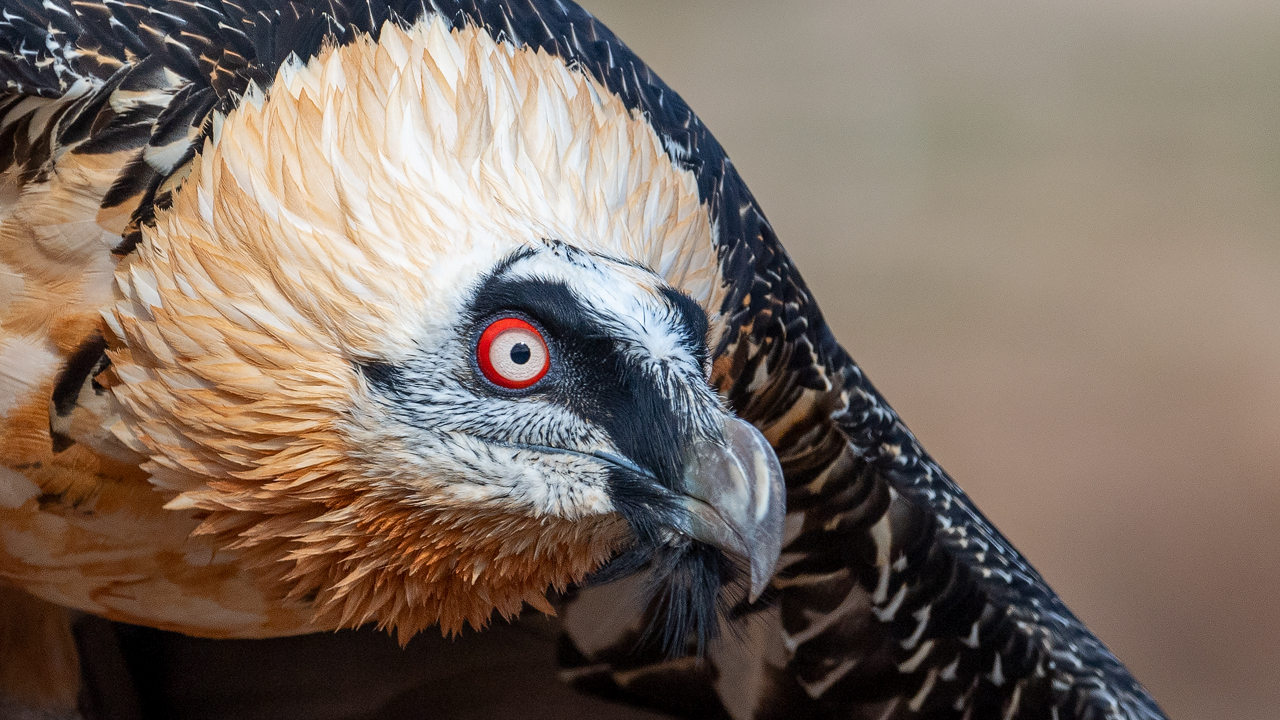Online workshops
Nine online workshops were organised and guided by the Campaign coordinators between February 2022 and July 2023.
The video recordings are available in the Member Area and in the closed EAZA21+ Facebook group.
1. How can I make the most out of EAZA21+ Campaign? (3 February 2022)
Led by Kirsten Pullen (former Wild Planet Trust / Paignton Zoo)
Speakers:
-
Helsinki Zoo team: Sanna Hellström, Nina Trontti, Lotta Kivalo, Marjo Priha
-
Tomasz Rusek (EEO)
Main topics addressed:
-
Presentation of EAZA21+: topics, goals and expectations.
-
Virtual roundtable with the team from Helsinki Zoo to simulate a “reflection group”: discussion around the zoos’ strengths and gaps to be more impactful in conservation and expectations from EAZA21+.
-
The benefits of knowledge and expertise sharing for a single zoo and the whole EAZA community. Examples from wildlife trade and conservation education areas.

2. Global biodiversity targets for 2030 and 2050? What do I need to know about them? (3 March 2022)
Led by Simon Bruslund (former Marlow Bird Park)
- Kristin Leus (EEO/ Copenhagen Zoo)
- Friederike von Houwald (Bern Zoo)
- Marjo Priha (Helsinki Zoo)
- Danny de Man (EEO)
- Tomasz Rusek (EEO)
Main topics addressed:
-
The post-2020 Global Biodiversity Framework: introduction, differences with the Stategic Plan for Biodiversity 2011-2020, most relevant issues for EAZA (Targets 4 and 5, increasing understanding, awareness and appreciation of the values of biodiversity).
-
EAZA21+ ambitions and how individual actions make EAZA stronger.
-
Case study: the alpine beetle as a joint conservation project to conserve EU native species.
-
Discussion in breakout room around the conservation of local biodiversity, the role of EAZA zoos in the post-2020 Global Biodiversity Framework, the challenges for preparing, adopting and implementing a conservation strategy and working with governments and local authorities.

3. Holistic thinking in your conservation strategy (5 July 2022)
Led by Tomasz Rusek and Alice Albertini (EEO)
-
Tiit Maran (Tallinn Zoo)
-
Andrea Dempsey (WAPCA/ Paradise Wildlife Park/ Heidelberg Zoo)
-
Simon Dowell (Chester Zoo)
Main topics addressed:
-
Main challenges in writing a conservation strategy and shared tips on how to overcome them, as a recap of the workshop held at the EAZA Conservation Forum in Zagreb.
-
One Plan philosophy and holistic approach: definitions, classical species conservation vs holistic approach, long-term vision for a zoo’s conservation strategy, how to talk to our communities and governments, the EAZA motto Progressive zoos and aquariums saving species together with you.
-
Case study: One Plan Approach in primate conservation. The West African Primate Conservation Action (WAPCA): in situ and ex situ conservation, research and conservation education.
-
Case study: Chester Zoo’s Conservation Masterplan. How to apply One Plan thinking in conservation apart from the zoo size.

4. Genetic diversity (13 September 2022)
Led by Tomasz Rusek and Alice Albertini (EEO)
-
Christina Hvilsom (Copenhagen Zoo)
-
Peter Galbusera (Antwerp Zoo)
-
Jessica Wise (RZSS)
-
Jasper Hughes (RZSS)
-
Anna Mekarska (EEO)
Main topics addressed:
-
Introduction to genetic diversity: definitions and main elements.
-
Conservation genetic history, including policy achievements.
-
The role of zoos in monitoring genetic diversity.
-
The EAZA Biobank.
-
Case study: the conservation of the Golden-headed lion tamarin and all the stakeholders involved.
-
Genetic diversity in conservation education.

5. Applying for funding (7 February 2023)
Led by Tomasz Rusek and Alice Albertini (EEO)
- Frédéric Houssaye (CERZA Zoo)
- Merel Zimmermann (EEO)
- Eva Paparatti (LIFE NGO)
- Julia Bethe (Biodiversa+)
- Clara Superbie (Biodiversa+)
- Ivan Cizelj (Zagreb Zoo)
- Lisbeth Zechner (CEN-PACA)
- Petr Sramek (Brno Zoo)
Main topics addressed:
-
Key steps of a grant application.
-
Funding opportunities under the new LIFE Regulation.
-
Biodiversa+: the new European biodiversity partnership.
-
Case-studies for European grants: “LIFE for Mauremys” project, LIFE “SOS Crau Grasshopper”.
-
Case study for national grants: the conservation of common hoopoe and its habitat.

6. Animal acquisition and disposition (12 April 2023)
Led by Danny de Man (EEO), supported by Tomasz Rusek and Alice Albertini (EEO)
Main topics addressed:
-
Introduction on wildlife trade and the regulatory frameworks.
-
Ongoing work of the EEP Committee on new EAZA Acquisition and Disposition Rules and procedures: presentation, surveys of participants’ opinions and open discussion on:
- Legal, sustainable and ethical trade.
- Import from the wild.
- Non-EAZA (including private) holders.
- Non-commercial disposition and acquisition.
- Due diligence.
- Intermediate parties.
- Traceability and transparency.

7. The Kunming-Montreal Global Biodiversity Framework and its targets (10 May 2023)
Led by Tomasz Rusek and Alice Albertini (EEO)
-
Matea Vukelic (UNEP-WCMC)
-
Philip McGowan (Newcastle University/ Chair of the IUCN SSC Post 2020 Biodiversity Targets Task Force
-
Cristiano Vernesi (G-BiKE)
-
Andrew Mooney (Dublin Zoo)
Main topics addressed:
-
EAZA21+ and its links with the EU Biodiversity Strategy and the GBF.
-
The GBF: goals, targets, indicators and monitoring framework. How to implement the GBF at national level.
-
How can EAZA zoos/aquariums contribute to the implementation of the GBF: most relevant targets, with a focus on Target 4 (conservation of species and genetic diversity), and opportunities for the EAZA community.
-
Case study: the G-BiKE consortium advocating for the inclusion of genetic diversity and a global indicator in the text of the GBF. How to support policymakers with advice and science-based evidence.
-
Case study: Dublin Zoo’s Conservation Master Plan. How to identify gaps and opportunities, work with local authorities and align the zoo conservation strategy with the GBF and other national and international strategies (e.g., UN SDGs).

8. The new EAZA Field Conservation Standards (13 June 2023)
Led by Merel Zimmermann (EEO), supported by Tomasz Rusek and Alice Albertini (EEO)
-
Arne Schulze (ZGAP)
-
Tobias Kohl (Stiftung-Artenschutz)
-
Brice Lefaux (AfdPZ/ Mulhouse Zoo)
-
Friederike Von Houwald (Bern Zoo)
Main topics addressed:
-
Writing and implementing a conservation strategy: lessons learnt over EAZA21+ and how to address the GBF and its targets.
-
The new EAZA Field Conservation Standards: introduction and guidance to put them into practice.
-
Case-studies: how ZGAP and AfdPZ select the conservation projects to be funded.
-
Case study: how Bern Zoo defines its conservation priorities and implement them.

9. Conservation Education (5 July 2023)
Led by Tomasz Rusek and Alice Albertini (EEO)
-
Laura Myers (EEO)
-
Tomislav Krizmanic (Zagreb Zoo)
-
Georgina Spyres (Athena Research Center)
-
Aileen Tennant (Dublin Zoo)
Main topics addressed:
-
Maximising the Conservation Education mission: lessons learnt over EAZA21+ and how to align the GBF and its targets in the zoo conservation education strategy.
-
The new EAZA Conservation Education Standards: introduction and guidance to put them into practice and their connection with the GBF.
-
How to leverage the conservation education work to effectively contribute to biodiversity conservation. The use of measurable, evidence-based actions to drive behavioural change after a strategic analysis of needs and interventions.
-
Case study: Zagreb Zoo’s Education Plan and its preparation for the Conservation Education Strategy.
-
Case study: Dublin Zoo’s Conservation Education Master Plan: challenges, opportunities and benefits.

In person events
Ten in-person events (with the exception of the 2021 Annual Conference, forced to be online due to the Covid-19 pandemic) were organised from the launch to the end of EAZA21+. They were part of the EAZA conferences and their topics tailored to the expected audience. Video recordings (in the Member Area or on the EAZA YouTube channel) are available for some of the listed events.
1. Conservation campaign plenary at the EAZA Online Annual Conference, 11 October 2021
Led by Simon Bruslund (former Marlow Bird Park)
- Eric Bairrão Ruivo (Beauval Zoo)
- Jon Paul Rodríguez, keynote speaker (Chair of the IUCN SSC)
- Bengt Holst (former Copenhagen Zoo)
Video testimonials with:
-
Onnie Byers (IUCN SSC CPSG)
-
Ute Goerres (DG Environment, European Commission)
-
Johannes Fritz (Waldrappteam)
-
Annemarieke Spitzen (RAVON)
-
Arnaud Desbiez (Wild Animal Conservation Institute)
Main topics addressed:
-
First presentation of EAZA21+: new features compared to the previous EAZA campaigns, overall scope and ambitions, next steps and planned activities.
-
The IUCN’s approach to the post-2020 GBF negotiations.
-
The role of EAZA zoos and aquariums in the EU Biodiversity Strategy and the post-2020 Global Biodiversity Framework.

2. EAZA21+ at EAZA Directors' Days at Beauval Zoo, 5-8 April 2022
Session 1 led by Eric Bairrão Ruivo (Beauval Zoo). Session 2 led by Bengt Holst (Copenhagen Zoo)
-
Mathias Loertscher (Head of Swiss CITES Management Authority, Chair of CITES Animals Committee)
-
Cécile Erny (AFdPZ)
-
Danny de Man (EEO)
-
Tomasz Rusek (EEO)
Main topics addressed:
- Session 1. EAZA21+? What is in the campaign for directors of EAZA Member institutions?
- Introduction to the session and overall campaign refresher.
- How EAZA21+ links the biodiversity frameworks to the practice of EAZA and its Members.
- Session 2. EAZA21+ deeper dive: EAZA Members and wildlife trade
- CITES as a framework and point of reference for zoos.
- Example of campaigning against wildlife trafficking: AFdPZ.
- EAZA Members and animal acquisition and disposition. The need to get our house in order.

3. Workshop “Developing an institutional Conservation Strategy - challenges and opportunities” at the EAZA Conservation Forum at Zagreb Zoo, 20 May 2022
Led by Merel Zimmerman (EEO), supported by Danny de Man, Tomasz Rusek and Alice Albertini (EEO)
-
Andrea Bračko (Zagreb Zoo)
-
Simon Bruslund (former Marlow Birdpark)
-
Mats Höggren (Nordens Ark)
Main topics addressed:
-
Introduction on the zoo conservation strategy.
-
Examples of conservation strategies/plans/philosophy from the EAZA community and benefits they bring.
-
Identification of the main challenges in writing a and implementing a conservation strategy and how to overcome them (online polls and group activity).

4. Plenary session “The Bigger Picture” at the EAZA Annual Conference in Albufeira, 28 September 2022
Led by Tomasz Rusek (EEO) and Simon Bruslund (Copenhagen Zoo)
Speakers:
-
Hugo-Maria Schally, video recorded (European Commission, DG Env)
-
Christina Hvilsom (Copenhagen Zoo)
-
Kirsten Pullen (former Paignton Zoo)
-
Marjo Priha (Helsinki Zoo)
-
Eric Bairrão Ruivo (Beauval Zoo)
Main topics addressed:
-
Overview of EAZA21+: key topics, planned activities, how EAZA Members can contribute and benefits from the three main areas of EAZA21+.
-
Background of the GBF: global biodiversity crisis, European Green Deal, CBD and main elements of the GBF, EU and Member States position on GBF goals, process towards COP 15 in Montreal.
-
Focus on conservation of species and genetic diversity: main features of genetic diversity, examples from the EAZA community and opportunities.
-
Focus on wildlife trade: pre-Campaign survey results and the need for increasing confidence and competence to talk about trade topics, EAZA’s provisional definitions and next steps for the drafted new EAZA rules on animal acquisition and disposition.
-
Focus on conservation education: links to the GBF, versatility of conservation education, frameworks for quality conservation educations and targets to achieve, opportunities for driving behaviour change in the EAZA community.
-
Updates from the Silent Forest Campaign and preparatory work for the CITES COP 19 in Panama.
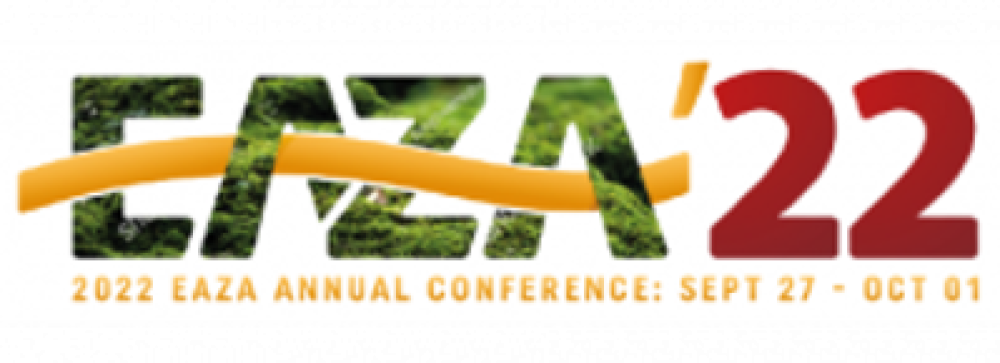
5. Workshop “Animal Acquisition and Disposition” at the EAZA Annual Conference in Albufeira, 29 September 2022
Led by Danny de Man (EEO), supported by Raymond van der Meer, William van Lint, Alice Albertini (EEO)
Main topics addressed:
-
How EAZA has positioned itself within the international regulatory framework and agreements on wildlife trade: the EU Biodiversity Strategy and EAZA’s response, the GBF, the EU Action Plan against wildlife trafficking and IUCN motions on songbirds’ and tigers’ trade.
-
EAZA Acquisition and Disposition Rules and procedures: presentation, online polls and open discussion.

6. EAZA21+ game workshop “Walk a Mile in My Shoes” at the EAZA Annual Conference in Albufeira, 30 September 2022
Led by Alice Albertini (EEO), supported by Borja Reh (EEO)
The EAZA21+ game is tested for the first time with some voluntary participants. First feedback are collected.

7. Presentation “Reflecting on the EAZA 21+ Campaign” at the EAZA Education Conference at Wrocław Zoo, 17 March 2023
Led by Alice Albertini (EEO)
Main topics addressed:
-
Updates on EAZA21: available material, reflection groups, GBF and its focus on transformative, innovative and transdisciplinary education.
-
Opportunities for Conservation Education to be explored at global, national, local and zoo scales.

8. EAZA21+ game workshop “Walk a Mile in My Shoes” at the EAZA Education Conference at Wrocław Zoo, 17 March 2023
Led by Alice Albertini (EEO), supported by Laura Myers (EEO)
The EAZA21+ game is tested for the second time, with improved content and material. It is tailored to be played with educators.

9. EAZA21+ at EAZA Directors’ Days at Bergen Aquarium, 25-28 April 2023
Led by Danny de Man (EEO)
Speakers:
-
David Roberts (University of Kent)
-
Kirsten Pullen (former Paignton Zoo)
-
Antonieta Costa (Lisbon Zoo)
-
Sanna Hellstrom (Helsinki Zoo)
Main topics addressed:
-
Aquariums, zoos and the illegal wildlife trade.
-
Acquisition of illegal wildlife opens zoos to significant risks (reputation, impact on activities with other stakeholders).
-
Case study: earless monitor lizard (paper by Vincent Nijman).
-
CITES regulates legality but illegalities can also happen beyond CITES (e.g., Nagoya Protocol on access and benefit sharing).
-
Overview of EEP Committee’s work on defining legal, sustainable and ethical animal transactions and the new EAZA policy on animal acquisition and disposition.
-
Case study: Building a culture of conservation education at Helsinki Zoo.
-
Implementing the EAZA Conservation Education Standards. Why social engagement is so significant.

10. Plenary session “Our local actions in the global puzzle” at the EAZA Annual Conference at Helsinki Zoo, 15 September 2023
Led by Tomasz Rusek and Alice Albertini (EEO)
Speakers:
-
Philip McGowan, keynote speaker (Professor at Newcastle University and chair of the IUCN SSC’s Post-2020 Biodiversity Targets Task Force)
-
Kirsten Pullen (former Paignton Zoo)
-
Frédéric Houssaye (CERZA Zoo)
-
Simon Bruslund (Copenhagen Zoo)
-
Eric Bairrão Ruivo (Beauval Zoo)
Main topics addressed:
-
Overview of EAZA21+: challenges, organised activities, achievements and opportunities for the future.
-
The GBF: global targets and their implementation at local level. How the EAZA community can contribute.
-
Focus on conservation of species and genetic diversity (target 4 of the GBF): Members’ opportunities and how to implement conservation management actions aligned with the GBF.
-
Focus on wildlife trade (target 5 of the GBF): EAZA’s position and how to continue growing Members’ confidence, competencies and buy-in for the EAZA goal of ensuring that wildlife is only traded legally, sustainably and ethically.
-
Focus on conservation education: how to build a culture of conservation education and how to benefit from the collaboration between curators and educators in the EEPs.

Please click here to go back to the Toolkits page.
Please click here to go back to the EAZA21+ page.

